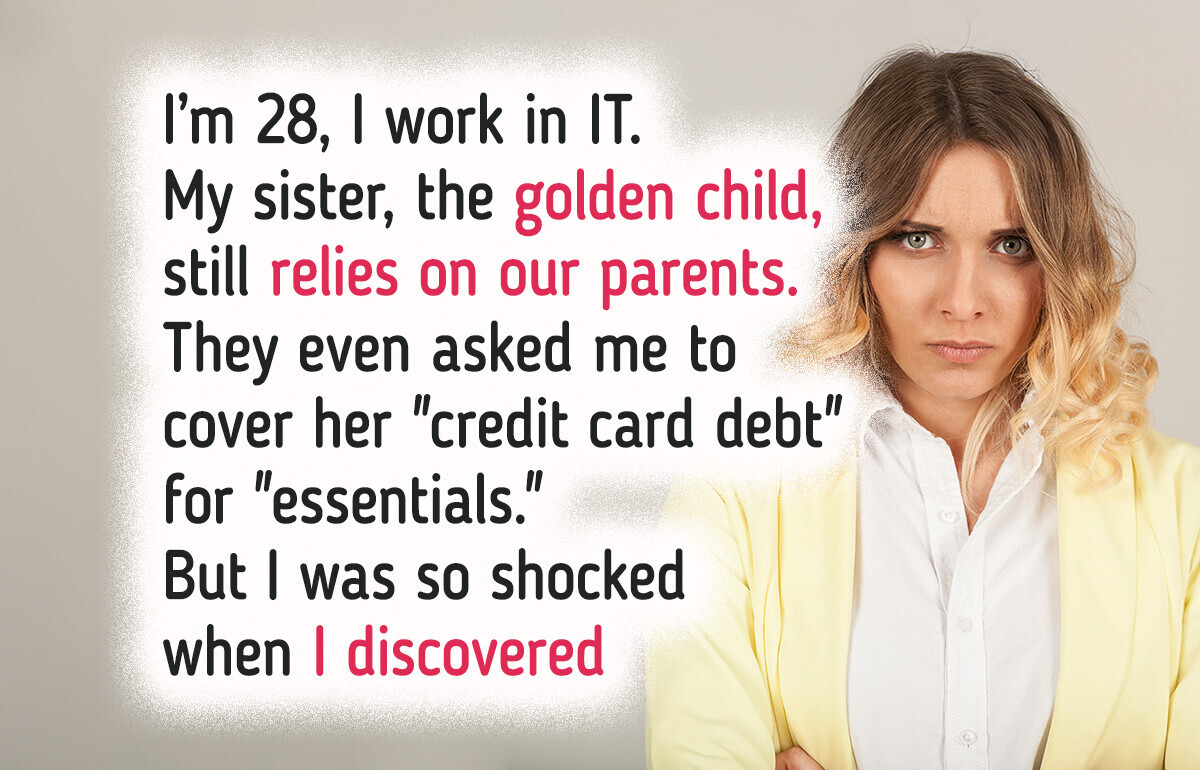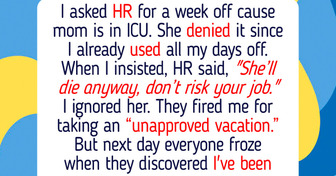Absolutely NTA but why would you think you were?? Did your family use you so much that you don't see your own self worth?? You deserve BETTER!! Stop funding your lazy greedy sisters life!! Tell her to grow up and anyone who has an opinion can PAY her bills!! Tell your parents your happy they want to help her out from now on watch how fast their tune changes!!
I Won’t Tolerate My Young Sister’s Selfish Behavior, She Needs to Grow Up

Being the older sister often means being the more responsible one. Just like in the story, we received below from one of our readers, who shared her problems with her younger sister and the family’s reaction to her behavior.
Ann’s letter:
Dear Bright Side,
I’m 28, I work in IT. My sister Jenna, the golden child, jumps between jobs and still relies on our parents. They even asked me to cover her “credit card debt” for “essentials.”
But I was so shocked when I discovered from a mutual friend that Jenna used the money for partying in Miami — flights, fancy Airbnb, clubs. When I brought it up, my parents didn’t deny it. They said she “deserves to enjoy life,” and I shouldn’t “make everything about money.”
Here’s the kicker — while I was helping her pay off her debt, I discovered that Jenna had been secretly using the money to fund a lavish lifestyle. Not only had she been partying in Miami, but she was also spending on designer clothes, luxury makeup, and even a new iPhone.
When I confronted her, she admitted she was living it up, but said she “needed a break” and that “life is too short.”
I told my parents I was done sending money. Since then, they’ve called me cold and selfish. Jenna hasn’t spoken to me, but posted a passive-aggressive story about “fake people” who can’t appreciate “the little things.”
I know I’m not obligated to keep paying, but what do you think? Did I go too far by cutting it off completely?
Sincerely,
Ann
Thank you, Ann, for sharing your story. It sounds like a tricky situation, which certainly seems unfair to you. Let’s try to check out all the different angles of it.
Your reaction
It’s normal to feel betrayed. You were told the money was for “essentials,” only to find out it went toward partying, luxury items, and a vacation. That’s not just frustrating — it’s deceptive. What Jenna did wasn’t just irresponsible; it was dishonest.
And when you confronted her? She admitted it and doubled down, saying she “needed a break” and that “life is too short.” That might be her philosophy, but your hard-earned money shouldn’t finance it.
Meanwhile, your parents’ behavior and calling you “cold and selfish” aren’t fair or true. What you did wasn’t cutting someone off; it was ending an unhealthy dynamic.
The golden child syndrome
Being born first can decide someone’s behavior and status in the family. Older siblings are usually more responsible, focused, and committed to the family. They also have to face some pressure to be the perfect ones, to be an example for their younger siblings who can have much more freedom and live their lives without any commitments.
When one family member is consistently prioritized — especially at others’ expense — it can create toxic dynamics. The golden child may be overprotected by their parents and shielded from criticism or consequences, while siblings are held accountable for their mistakes. Just like it happened in your case, your sister, Jenna, seems to be the golden child in your family.
Setting boundaries
It might be time to set some boundaries with your family. Taking your own needs into consideration and putting those needs above the needs and wants of others is a great way to get started setting your boundaries with difficult family members.
It may also be time to accept that you won’t get your parents’ validation. That’s incredibly painful, but recognizing their bias is the first step in freeing yourself from the unfair expectations they’ve placed on you.
Protecting your time, money, and mental peace doesn’t make you cold — it means you’re learning how to love people without losing yourself. Jenna might not thank you now, but you’ve taken the first step in breaking a toxic family cycle.
Ann is not the only one who has to deal with complicated family members. You can read about worse cases in our 19 Family Members You Wouldn’t Wish on Your Enemies article.
Comments
Related Reads
I Refused to Accept My Biological Dad When He Came Back, but My Mom Insisted I Do

10 Stories That Can Keep You on the Edge From Start to Finish

My Pregnant Wife Has Been Hitting the Gym Obsessively, and Her Workouts Hid an Ugly Secret

My Ex-Husband Chose His New Family Over Our Son—I Gave Him a Lesson He Won’t Forget

15 Stories From Housekeepers That Truly Stunned Us

My Brother-in-Law Never Pays His Share, So I Gave Him a Dose of His Own Medicine

I Refused to Share My $400K Lottery Winnings With My Family

11 Stories of Stepparents Who Chose Kindness Through Tough Times

I Was Fired for Taking Days Off During a Family Emergency

15+ Times an Unexpected Guest Turned an Ordinary Day Into a Scene Straight Out of a Movie

I Refuse to Return My Late Colleague’s Paycheck, Now His Widow Is Furious

22 Moments That Prove Quiet Kindness Can Work Real Miracles






